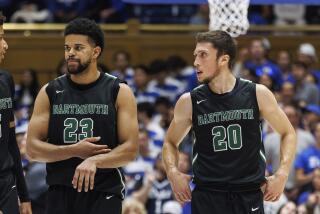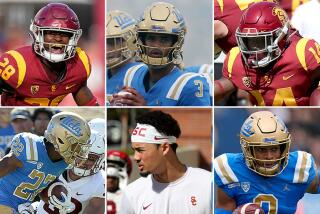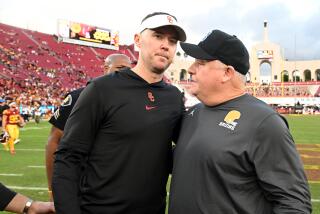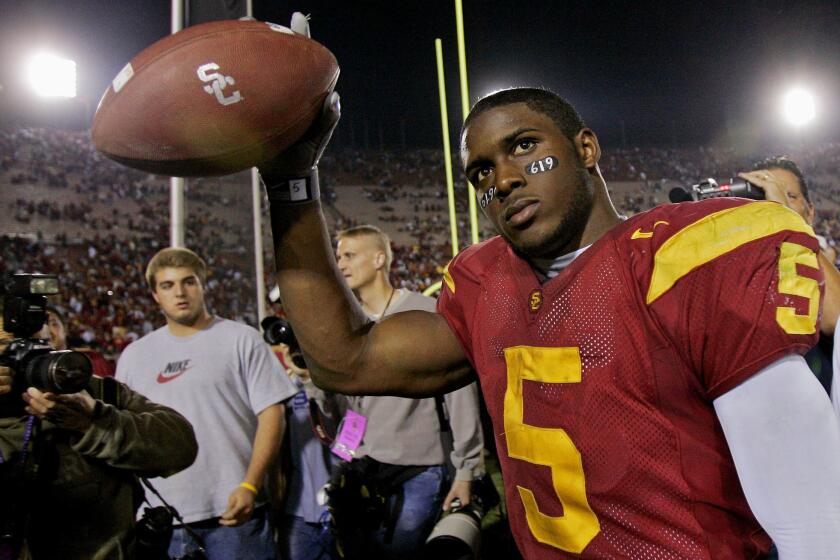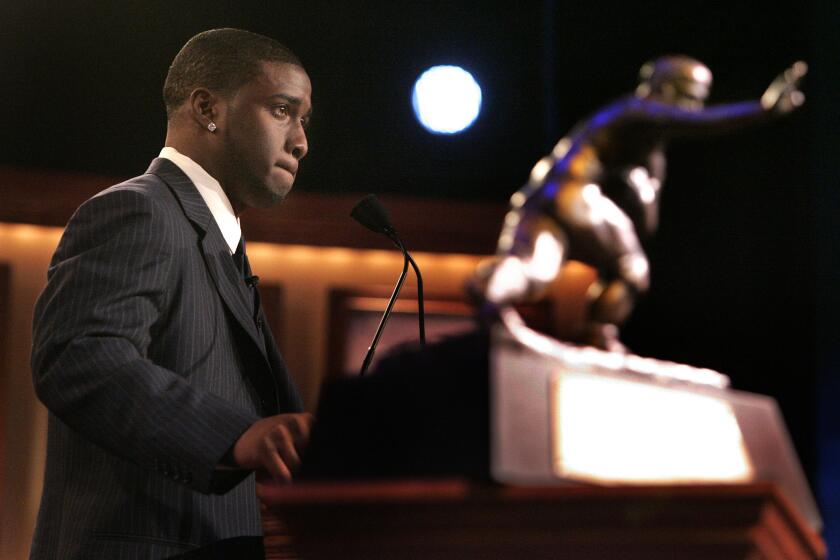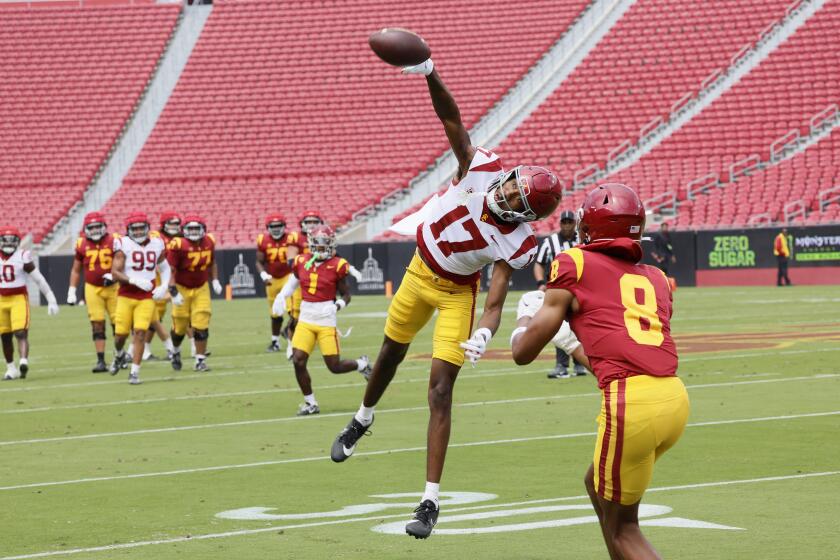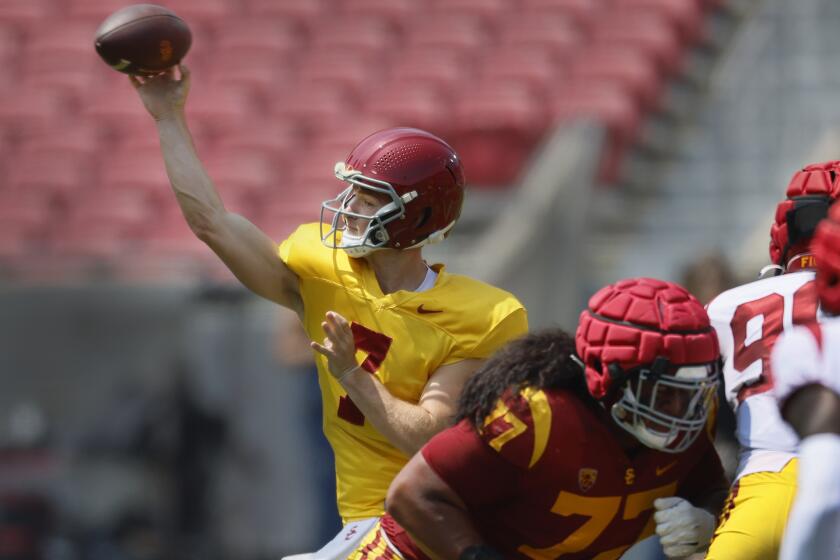USC, UCLA athletes keeping eye on Northwestern unionization case
Don’t look for the union label around USC’s or UCLA’s football practice facilities any time soon.
Football players at both schools are aware that Northwestern players might unionize. But when asked about the issue recently during spring practice, several said they were only casually monitoring the situation.
“There has been some small talk around the locker room,” said UCLA quarterback Brett Hundley. “We’ll get a lot more information. Obviously, they are starting something.”
Northwestern players will vote Friday on whether to unionize. Last month, a regional director of the National Labor Relations Board cleared the way for that vote by ruling that Northwestern scholarship players were employees of the university, a decision the school has appealed.
The NLRB on Thursday granted Northwestern’s request for review. The players’ votes will be impounded until the review process is completed.
The NLRB has jurisdiction over private universities but not public schools. USC is one of 17 private institutions among 128 Football Bowl Subdivision schools.
Several USC players said they were aware of the unionization effort at Northwestern but they were not actively tracking it.
“No one really wants to focus on that union thing,” said sophomore offensive lineman Zach Banner. “We understand it affects us because we’re a private school…. but we just need to wait and see.”
USC Athletic Director Pat Haden met with the football team to discuss unionization and other issues and to field questions from players. He also met separately with the Trojan Athletic Senate, composed of athletes from various sports.
“These are all bright kids,” Haden said. “We’re an academic institution. This is supposed to be a time for intellectual growth and we welcome it.”
UCLA, as a state school, is not affected by the NLRB ruling.
The Bruins remain intrigued by the movement.
“College students need and want money for what we do,” said UCLA receiver Devin Lucien. “I support what they are doing. I think it needs to happen.”
During a news conference at the men’s basketball Final Four, NCAA President Mark Emmert told reporters, “The notion of using a union employee model to address the challenges that do exist in intercollegiate athletics is something that strikes most people as a grossly inappropriate solution to the problems.”
Instead, the NCAA appears to be taking small steps toward change.
Last week, the NCAA’s Legislative Council approved a proposal that would allow Division I schools to provide unlimited meals to scholarship and walk-on athletes, a move universally welcomed by players who have publicly and privately complained of going hungry.
Several USC and UCLA athletes expressed their delight.
On Thursday, the Division I Board of Directors endorsed a restructuring process that would give the Pac-12, Atlantic Coast, Big 12, Big Ten and Southeastern conferences more autonomy on financial aid, insurance, academic support and other support, such as travel for families.
Haden has advocated for the NCAA to approve scholarships that cover the full cost of attendance, describing it as “a no-brainer.”
At USC, a full athletic scholarship covers tuition and fees, room, board and required course-related books. For 2013-14, a USC athletic scholarship was about $60,000-$61,000, an athletic department official said. But the NCAA does not allow schools to factor in costs for transportation and personal expenses.
The full cost of attendance, according to USC’s website, was $62,245. The cost includes an estimated $580 for transportation and $900 for personal expenses.
Players living on campus receive $12,902 for room and board, which is paid directly to the university, the official said. Players living off campus received nine monthly payments of $1,529, he said.
If players are enrolled in summer school, the stipend continues, the official said.
Players said the cost of rent and other essentials leave them with few or no money at the end of the month.
“I’m not saying they should pay us, but they should raise the stipend in certain areas to equal the living costs,” said junior cornerback Kevon Seymour.
“Something’s got to change,” Banner said. “We’re struggling.”
At UCLA, a full scholarship for 2013-14 was $32,563 for an athlete who lived on campus and $29,443 for one who lived off campus. The scholarship also covered the $22,878 out-of-state fee for non-California residents.
A player living on campus received an average $14,454 for room and board. Players living off campus received an average of $10,446 for room and board. The scholarship provided $1,395 for those living in dormitories, $1,662 for those living off campus.
In March, when the initial Northwestern ruling was made public, USC Coach Steve Sarkisian quipped, “I’ve got to figure out which one of our players is going to come to me as our union rep.”
A few weeks later, he said he favored improving food availability and stipends for players but added, “I just don’t know if I agree with unionizing and losing the integrity of the college experience that the kid has from the time he’s 18 to 22 years old.”
UCLA Coach Jim Mora said he would “leave it up to the smarter people to figure out.”
“I know how demanding this is on these kids,” Mora said. “I know the sacrifices they make. I see it firsthand. I also know the great benefits they get going to a school like UCLA for free. I get frustrated when our student athletes can’t take a girl out to the movie and get a pizza on Friday night because they don’t have any money.”
Meantime, football players at both schools will follow the Northwestern case.
“There is good thought and reasoning behind what is going to come,” Hundley said. “There is change coming around. There are a lot of things that should be happening.”
Twitter: @latimesklein
Twitter: @cfosterlatimes
More to Read
Go beyond the scoreboard
Get the latest on L.A.'s teams in the daily Sports Report newsletter.
You may occasionally receive promotional content from the Los Angeles Times.
